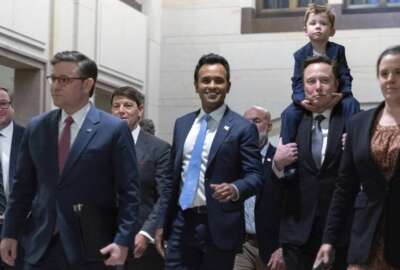The IRS recovered $1 billion in overdue taxes. Will that save its future funding?
The IRS recently announced it had collected $1 billion in overdue tax revenue, after launching a crackdown on millionaires not paying what they owe.
It sounds simple, but it’s taken a while to get to the realization. For an agency to be effective, it needs the right amount of people and resources. The most recent example is the success the IRS has been seeing. As reported by Federal News Network, the agency recently announced it had collected $1 billion in overdue tax revenue, after launching a crackdown on millionaires not paying what they owe. Will it be enough evidence, though, to secure the IRS with the proper funding it needs going forward? For more on this, Bob Tobias, former professor in the Key Executive Leadership program at American University and a former federal union president, joined Federal News Network executive producer Eric White on the Federal Drive with Tom Temin.
Interview transcript:
Eric White Mr. Tobias, thank you for taking the time.
Bob Tobias Nice to talk to you, Eric.
Eric White Absolutely. Likewise. So, why don’t you just kind of give me an overview of what you see, as, you know, the IRS announcing success? Looks like it’s finally getting the technology and resources that the leadership there has always been wanting, but is more needed? And, you know, is this going to be kind of what we’re going to see more from the agency?
Bob Tobias So, Eric, the IRS recently announced that as the result of its increased funding of $60 billion over the next 10 years, that it was able to hire more auditors. And the results were really, really impressive. First, the audit rates on wealthy taxpayers with income over $10 million, began moving from 11% coverage, to, in 2019, to 16.5%, in 2016, and as you suggested, they already collected $1 billion from these folks who are making $10 million or more. I mean, you know, that’s kind of pocket change for people in that income range. And Treasury Secretary Janet Yellen announced that the increased resources coupled with more technology is going to yield $851 billion over the next 10 years, which is a 14% return on investment of $60 billion. And I asked you, Eric, which private sector firm would turn down a 14% return on its investment,? And I would say, no one would. Now, and I can see that there are some people who always don’t believe that $851 billion will be collected. And maybe that will turn out to be true. But I do know that it will collect at least $60 billion from people who currently are not paying what they owe. And I suggest that’s real progress. But what’s even more interesting to me is that it recently sent 25,000 non-filing notices to taxpayers making more than $1 million, and 25,000 non-filing notices to those who are making $400,000. Now, a non-filer is someone who just doesn’t file their taxes as required every single year. And they’re the kinds of individuals who are not on a salary. So, they don’t have money withheld. I mean, the people who have money automatically withheld, a 95 for compliance. So, these folks just thumb their nose at the entire system. And, so, before the infusion of the funds, before the better technology, they didn’t have the people to send the resources or make the contact. But now they’re going to be paying the money. And the research shows that once they start filing, they voluntarily comply in the future, so it’s just another added benefit. So, the audit rates, the non-compliance is getting better, dramatically better. But it’s not just increasing its audit success. The level of service, answering telephone calls, went from 11% in 2021 to 80% in 2024. And the only reason that happened, there were more people answering the phones. It wasn’t magic. It wasn’t increased training. It was just more people answering the phones, so that the level of service increased 88%. But notwithstanding that success, I expect that there are going to be those in Congress, who in the in the final throes of the fight over 2025 spending are gonna say, well, we need to cut the IRS. They’re too big, they’re unresponsive or whatever they say. And this would be at a time, Eric, when the IRS is increasing tax compliance, increasing the level of service and really serving the public. So, I’m hopeful. I’m really hopeful that the facts and the merits will lead a majority of the people in Congress to continue to fund the IRS at the level it needs to be successful.
Eric White Not to mention the amount of personnel that it now has, it’s also been able to adopt a new set of technology that has made those workers’ jobs easier. And that probably comes along with the increase in resources as well, right?
Bob Tobias It does. It’s one thing, Eric, if you haven’t filed for seven or eight years, and I find out that you haven’t filed for seven or eight years, and I have to get your paper returned, and I have to look through them to see how much you owe. I mean, that’s the approach that the IRS have taken for many years. Now, with its increased funding, it’s using artificial intelligence. And the taxpayer returns, they’re all online. And the artificial intelligence identifies those taxpayers who need to be audited. So it saves time, it saves energy, it saved from the IRS contacting people who are legitimately paying, and helps them focus on those who are not paying.
Eric White We’re speaking with Bob Tobias, former professor in the Key Executive Leadership program at American University. So, how could this be utilized for making the case for other agencies? Obviously, the IRS is an important one, and it’s the most politicized one. Are there ways that this could maybe be formulated to argue for funding for agencies that also face the same scrutiny, similar to the IRS?
Bob Tobias I think the IRS case is one that is very easy to make. Because the goals are so neat to name and identify. In some agencies, it’s much more difficult to define goals. In the IRS, they know how many tax we print audit. They know how many telephone calls answered, they know how much time is on each audit. So, they know what, how efficient the auditors are. So, I think the IRS, unlike most other agency, particularly good place to argue for additional funding.
Eric White Bob Tobias is the former professor with the Key Executive Leadership program at American University and a former federal union president. Mr. Tobias, thank you, as always.
Bob Tobias Thank you very much, Eric. It’s a pleasure to be with you.
Eric White Absolutely. The feeling is mutual. And you can find this interview along with more information at our website at federalnewsnetwork.com/federaldrive. You can also subscribe to the Federal Drive wherever you get your podcasts.
Copyright © 2025 Federal News Network. All rights reserved. This website is not intended for users located within the European Economic Area.
Eric White is news anchor and Federal Drive producer at Federal News Network.
Follow @FEDERALNEWSCAST






